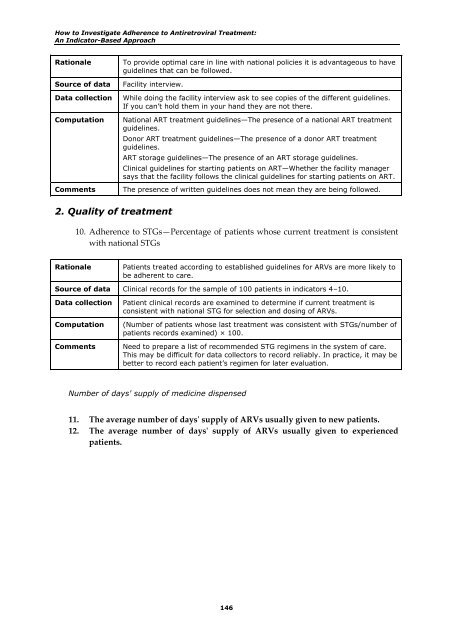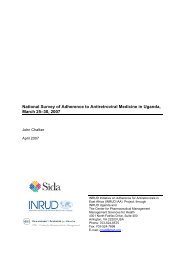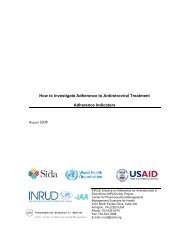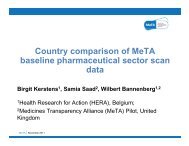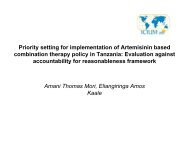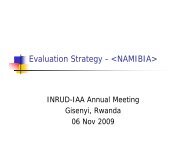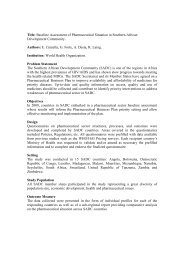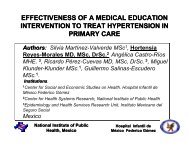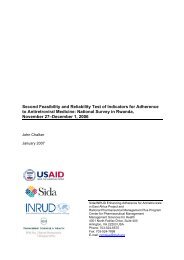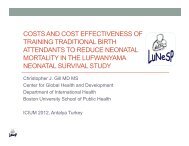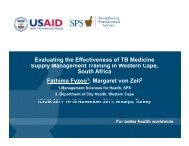How to investigate levels of Adherence to antiretroviral ... - INRUD
How to investigate levels of Adherence to antiretroviral ... - INRUD
How to investigate levels of Adherence to antiretroviral ... - INRUD
You also want an ePaper? Increase the reach of your titles
YUMPU automatically turns print PDFs into web optimized ePapers that Google loves.
<strong>How</strong> <strong>to</strong> Investigate <strong>Adherence</strong> <strong>to</strong> Antiretroviral Treatment:<br />
An Indica<strong>to</strong>r-Based Approach<br />
Rationale<br />
Source <strong>of</strong> data<br />
Data collection<br />
Computation<br />
Comments<br />
To provide optimal care in line with national policies it is advantageous <strong>to</strong> have<br />
guidelines that can be followed.<br />
Facility interview.<br />
While doing the facility interview ask <strong>to</strong> see copies <strong>of</strong> the different guidelines.<br />
If you can’t hold them in your hand they are not there.<br />
National ART treatment guidelines—The presence <strong>of</strong> a national ART treatment<br />
guidelines.<br />
Donor ART treatment guidelines—The presence <strong>of</strong> a donor ART treatment<br />
guidelines.<br />
ART s<strong>to</strong>rage guidelines—The presence <strong>of</strong> an ART s<strong>to</strong>rage guidelines.<br />
Clinical guidelines for starting patients on ART—Whether the facility manager<br />
says that the facility follows the clinical guidelines for starting patients on ART.<br />
The presence <strong>of</strong> written guidelines does not mean they are being followed.<br />
2. Quality <strong>of</strong> treatment<br />
10. <strong>Adherence</strong> <strong>to</strong> STGs—Percentage <strong>of</strong> patients whose current treatment is consistent<br />
with national STGs<br />
Rationale<br />
Patients treated according <strong>to</strong> established guidelines for ARVs are more likely <strong>to</strong><br />
be adherent <strong>to</strong> care.<br />
Source <strong>of</strong> data Clinical records for the sample <strong>of</strong> 100 patients in indica<strong>to</strong>rs 4–10.<br />
Data collection<br />
Computation<br />
Comments<br />
Patient clinical records are examined <strong>to</strong> determine if current treatment is<br />
consistent with national STG for selection and dosing <strong>of</strong> ARVs.<br />
(Number <strong>of</strong> patients whose last treatment was consistent with STGs/number <strong>of</strong><br />
patients records examined) × 100.<br />
Need <strong>to</strong> prepare a list <strong>of</strong> recommended STG regimens in the system <strong>of</strong> care.<br />
This may be difficult for data collec<strong>to</strong>rs <strong>to</strong> record reliably. In practice, it may be<br />
better <strong>to</strong> record each patient’s regimen for later evaluation.<br />
Number <strong>of</strong> days' supply <strong>of</strong> medicine dispensed<br />
11. The average number <strong>of</strong> days' supply <strong>of</strong> ARVs usually given <strong>to</strong> new patients.<br />
12. The average number <strong>of</strong> days' supply <strong>of</strong> ARVs usually given <strong>to</strong> experienced<br />
patients.<br />
146


